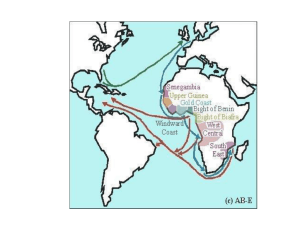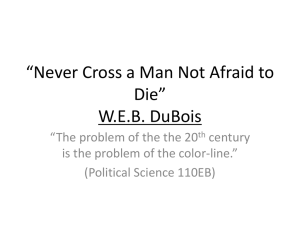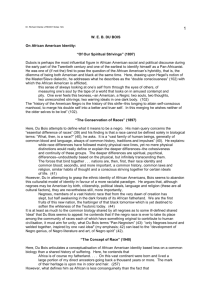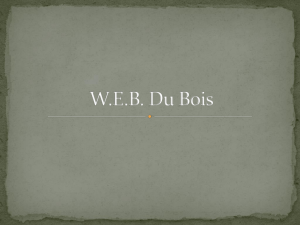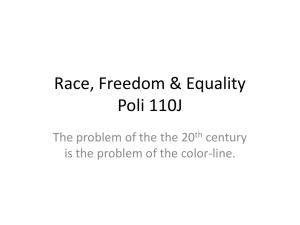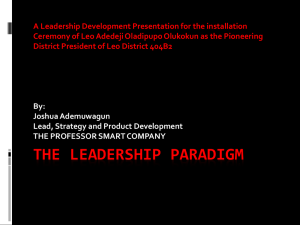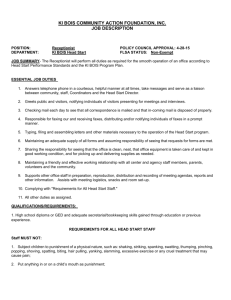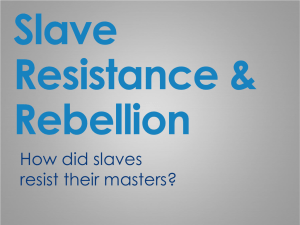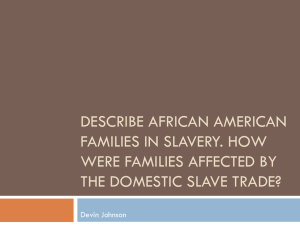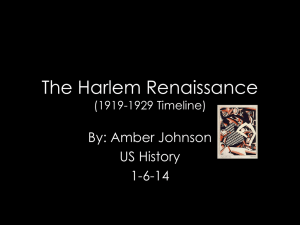10 Du Bois
advertisement
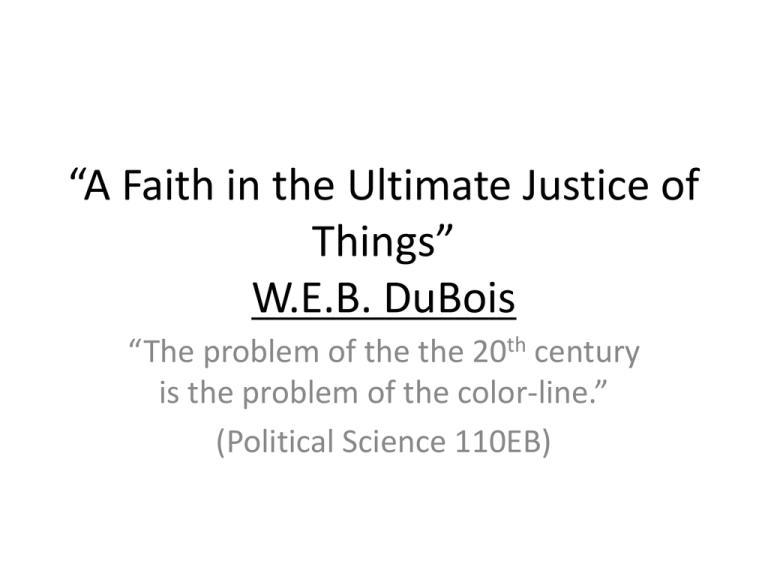
“A Faith in the Ultimate Justice of Things” W.E.B. DuBois “The problem of the the 20th century is the problem of the color-line.” (Political Science 110EB) W.E.B. Du Bois • • • • • 1868-1963 First black PhD at Harvard Pan-Africanist Radical (equality) Publisher of NAACP’s The Crisis • Friend of Max Weber • Communist – MLK: “It is time to cease muting the fact that Dr. Du Bois was a genius and chose to be a Communist.” 2 Du Bois gets radicalized • Sam Hose (1899) – Accused of murdering employer & raping his wife – Admits murder (over debt, possibly in self-defense), denies rape – Lynched w/2,000 witnesses outside of Atlanta – Emasculated, face skinned, tied to a tree and burned alive. Knuckles displayed for sale in shop window. – Lynching a communal activity – Du Bois comes to believe that “one could not be a calm, cool, and detached scientist while Negroes were lynched, murdered, and starved.” 3 Major Themes • • • • The Veil Double-consciousness Race consciousness Racial essentialism 4 Race Consciousness • “How does it feel to be a problem?” (7) – American society consistently and irresistibly forces awareness of one’s own blackness – Blackness is not a quality of appearance, but of identity • Not just what the individual looks like, but who the individual is – Blackness is a “problem” 5 The Problem of the Color Line • The problem of the twentieth century is the problem of the color-line,--the relation of the darker to the lighter races of men in Asia and Africa, in America and the islands of the sea.” (15) – Not geographical, but a “line” nonetheless. – A notably American (and to a lesser extent, European) way of looking at the world. • “Then it dawned upon me with a certain suddenness that I was different from the others; or like, mayhap, in heart and longing, but shut out from their world by a vast veil.” (8) – Parallel worlds – Restrictive only to blacks, who cannot move beyond the veil, while whites can move back and forth. • Privilege. 6 The color line • The American world “yields him no true selfconsciousness, but only lets him see himself through the revelation of the other world. It is a peculiar sensation, this double-consciousness, this sense of always looking at one’s self through the eyes of others” • “One ever feels his two-ness,--an American, a Negro; two souls, two thoughts, two unreconciled strivings; two warring ideals in one dark body, whose dogged strength alone keeps it from being torn asunder.” (8) – Internal division on the color line – Partly self, partly not-self – Constant internal conflict 7 The color line • Blacks exist in some sense on both sides of the color line – “He would not Africanize America, for America has too much to teach the world and Africa. He would not bleach his Negro soul in a flood of white Americanism, for he knows that Negro blood has a message for the world.” • Essentialism – Partly inherent, partly historical • “He simply wishes to make it possible for a man to be both a Negro and an American, without being cursed and spit upon by his fellows, without having the doors of Opportunity closed in his face. – “to merge his double self into a better and truer self.” (9) 8 The Role of Religion • “Given the peculiar circumstances of the black man’s environment [his religious institutions] were the one expression of his higher life.” – – – – Aesthetic Spiritual Philosophical Economic & social • “Three things characterize the religion of the slave” from which the black church descends – The Preacher – The Music – The Frenzy 9 The Preacher • “A leader, a politician, an orator, a ‘boss’, an intriguer, an idealist.” (129) • Descended from the Medicine Man/Priest – The chief could not survive enslavement, but the Priest could • Christianized by exposure & convenience • Center of the church organization 10 The Music • “Little of beauty has America given the world save the rude grandeur God himself stamped on her bosom; the human spirit in this new world has expressed itself in vigor and ingenuity rather than in beauty. – And so by fateful chance the Negro folk-song -the rhythmic cry of the slave -- stands to-day not simply as the sole American music, but as the most beautiful expression of human experience born this side the seas.” 11 The Music • “These songs, I have said, the slave spoke to the world. Such a message is naturally veiled and half articulate. Words and music have lost each other and new and cant phrases of a dimly understood theology have displaced the older sentiment. – Once in a while we catch a strange word of an unknown tongue, as the "Mighty Myo," which figures as a river of death; more often slight words or mere doggerel are joined to music of singular sweetness. • Purely secular songs are few in number, partly because many of them were turned into hymns by a change of words, partly because the frolics were seldom heard by the stranger, and the music less often caught. Of nearly all the songs, however, the music is distinctly sorrowful.” 12 The Music • “Through all the sorrow of the Sorrow Songs there breathes a hope -- a faith in the ultimate justice of things. The minor cadences of despair change often to triumph and calm confidence. Sometimes it is faith in life, sometimes a faith in death, sometimes assurance of boundless justice in some fair world beyond. – But whichever it is, the meaning is always clear: that sometime, somewhere, men will judge men by their souls and not by their skins. Is such a hope justified? Do the Sorrow Songs sing true?” • “Even so is the hope that sang in the songs of my fathers well sung. If somewhere in this whirl and chaos of things there dwells Eternal Good, pitiful yet masterful, then anon in His good time America shall rend the Veil and the prisoned shall go free. – Free, free as the sunshine trickling down the morning into these high windows of mine, free as yonder fresh young voices welling up to me from the caverns of brick and mortar below -- swelling with song, instinct with life, tremulous treble and darkening bass.” 13 The Music • “The most original and beautiful expression of human life and longing yet born on American soil” (129) – “Of death the Negro showed little fear, but talked of it familiarly and even fondly” • “They tell us in these eager days that life was joyous to the black slave, careless and happy…” But these songs are “the music of an unhappy people, of the children of disappointment, they tell of death and suffering and unvoiced longing toward a truer world…” 14 The Frenzy • “When the Spirit of the Lord passed by, and, seizing the devotee, made him mad with supernatural joy” – “Old as religion, as Delphi and Endor” • “Many generations firmly believed that without this visible manifestation of the God there could be no true communion with the invisible.” 15 Du Bois on the church • The church is historically the core institution of black society in America – It predates even the monogamic black household – It remains the center of black society and economy – It is also the ethical and political center of black communities 16 Problems • Historically, especially in the South, the church has served not to undermine but to reinforce the oppression of blacks • “Nothing suited [the slave’s] condition better than the doctrines of passive submission embodied in the newly learned Christianity” • Deep religious fatalism – “Children we shall all be free/When the Lord shall appear!” 17 Problems • Transformation of the African into the slave – “Courtesy became humility, moral strength degenerated into submission, and the exquisite native appreciation of the beautiful became an infinite capacity for dumb suffering.” – Losing faith in this world, the slave looked to the next – Marxist criticism of class & religion as applied to race 18 The Enslaving Power of Ideas • Example: “The Coming of John” – John is happy in Altamaha, plays with the Judge’s boy • “One never sees in the North such cordial and and intimate relations between white and black as are everyday occurrences with us [Southerners].” – Goes away to school, sees wider world, advances himself. – “The white folk of Altamaha voted John a good boy, -- fine ploughhand, good in the rice-fields, handy everywhere, and always goodnatured and respectful. But they shook their heads when his mother wanted to send him off to school. "It'll spoil him, -- ruin him," they said; and they talked as though they knew. But full half the black folk followed him proudly to the station, and carried his queer little trunk and many bundles.” – Now wants to be addressed not by his first name, but as Mister. – On return to Altamaha, is denounced by others as “stuck up.” 19 The Enslaving Power of Ideas • “He urged unity, and deprecated especially religious and denominational bickering. "To-day," he said, with a smile, "the world cares little whether a man be Baptist or Methodist, or indeed a churchman at all, so long as he is good and true. – What difference does it make whether a man be baptized in river or washbowl, or not at all? Let's leave all that littleness, and look higher." Then, thinking of nothing else, he slowly sat down. A painful hush seized that crowded mass. Little had they understood of what he said, for he spoke an unknown tongue, save the last word about baptism; that they knew, and they sat very still while the clock ticked.” • “John never knew clearly what the old man said; he only felt himself held up to scorn and scathing denunciation for trampling on the true Religion, and he realized with amazement that all unknowingly he had put rough, rude hands on something this little world held sacred.” 20 The Enslaving Power of Ideas • Thus for Du Bois the structure & beliefs of black society, especially in the South, are complicit in the oppression of black people • Though the beliefs and desires are sincere, the are tools of the oppressing group – The Judge: “I like the colored people, and sympathize with all their reasonable aspirations, but you and I both know, John, that in this country the Negro must remain subordinate.” 21
